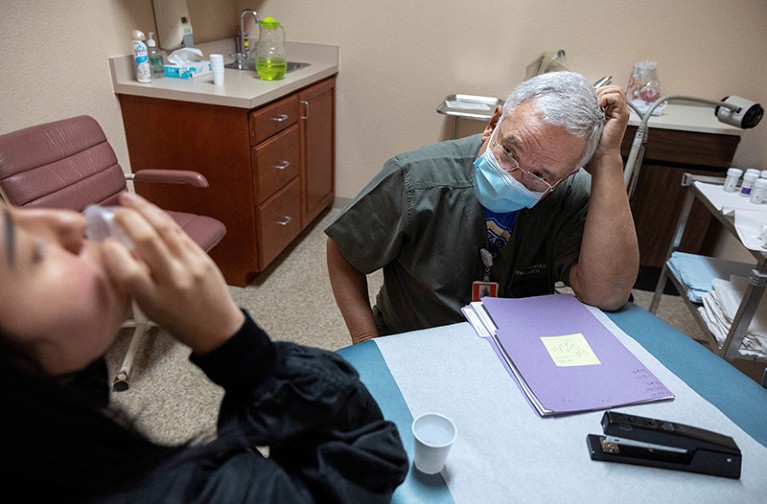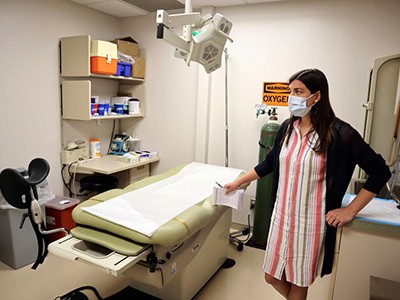
A physician at a clinic in New Mexico watches as a person takes the abortion pill mifepristone in 2023.Credit: Evelyn Hockstein/Reuters
Early this month, a scientific publisher retracted two studies1,2 cited by a federal judge in Texas when he ruled that the abortion pill mifepristone should be taken off the market, suggesting that the drug causes a burden on the public-health system. It also retracted a third3 that surveyed abortion providers in Florida, linking them to malpractice and disciplinary issues. According to Sage Publications, the first two papers had problems with study design and methodology and errors in data analysis. And all three included unsupported assumptions and misleading data presentations. In addition, the studies’ authors, many of whom are affiliated with anti-abortion organizations, failed to declare conflicts of interest, Sage said in its retraction notice.
Nature spoke to the researcher who contacted Sage with concerns about the papers, as well as to reproductive-health specialists to learn about the perceived issues that triggered the papers’ retractions. They praise the retractions, but say that there are many similar publications alleging the harms of abortion that have yet to be addressed.
James Studnicki, the lead author of the three papers and director of data analytics at the Charlotte Lozier Institute (CLI) in Arlington, Virginia, which describes itself as a pro-life research organization, said in a statement that there is “no legitimate reason for Sage’s retractions”, and that the authors “fully complied with Sage’s conflict disclosure requirements” by reporting their affiliations and CLI funding. The authors will be taking legal action against Sage, according to Studnicki.
Papers questioned
Table of Contents
Chris Adkins, a pharmaceutical scientist at South University in Savannah, Georgia, first came across one of the Sage papers after it was cited in April 2023 in a ruling by Matthew Kacsmaryk in the US District Court for the Northern District of Texas. Kacsmaryk pointed to the study, published in 20211, as evidence that mifepristone-induced abortions lead to an elevated incidence of emergency-room (ER) visits.
“I found enough issues in the paper that I felt compelled to reach out to the journal,” Adkins says — especially given its impact.

Activists protest against a ruling restricting the availability of the abortion drug mifepristone in Texas.Credit: Olga Fedorova/SOPA Images/Shutterstock
The Texas ruling has since been appealed, and the lawsuit has wended its way to the US Supreme Court, which will hear arguments in late March about whether mifepristone use should be restricted nationwide.
After hearing concerns about the 2021 paper, Sage began an investigation. Two more papers by some of the same authors were included in the review, and the publisher enlisted independent experts to examine the science behind the studies.
The 2021 paper compares the number of ER visits in the 30 days after a surgical abortion with those after a medication-induced abortion, using data from Medicaid, a US government programme that provides health insurance to people with limited resources. The conclusion, now retracted, was that medication-induced abortions were linked to more visits.
One problem, Adkins says, is that the study claims that the incidence of visits after any type of induced abortion is increasing year on year, without comparing the trend with that in overall ER visits. If overall ER visits were increasing owing to, say, a rise in Medicaid use, the trend could not be attributed to abortions becoming riskier.

Abortion-pill ruling threatens FDA’s authority, say drug firms
The authors pointed Nature to a rebuttal letter they publicly released after Sage’s investigation, in response to a request for comment. They deny that the study’s focus was on comparing people who had an abortion with those who didn’t. One conclusion listed in the paper begins: “The incidence and per-abortion rate of ER visits following any induced abortion are growing”.
Another issue raised by researchers is that the study uses ER visits as a proxy for abortion-related complications, says Ushma Upadhyay, a reproductive-health specialist at the University of California, San Francisco. “We know that many people go to an emergency department because they live too far from the abortion provider,” she says, and they want someone to check any bleeding they might experience after taking mifepristone. Many studies4 have shown that mifepristone is safe, and that bleeding is a normal, short-lived side effect of taking it — not a complication.
In their rebuttal letter, the authors quote from their 2021 paper, saying that ER visits are “particularly insightful” events to use when comparing the relative safety of chemical and surgical abortions. “Adverse events following a mifepristone abortion are more likely to be experienced at home in the absence of a physician, increasing the likelihood of an ER visit,” they add.
Although Sage did not publicly release the findings of its independent reviewers, the authors’ rebuttal letter gives insight into other problems that the experts flagged.

US lawsuit threatens access to abortion drug: the science behind the case
One of the papers, published in 20193, investigates the characteristics of physicians who provide abortions in the state of Florida. It says that nearly half of the abortion providers that the researchers evaluated had at least one malpractice claim, public complaint, disciplinary action or criminal charge against them, without providing any comparison with the overall rate of such claims in the general physician population. According to the rebuttal letter, two independent reviewers noted that, because abortion providers do not have to advertise their services publicly or necessarily register with the state, the cohort investigated by the authors might be biased in some unknown direction.
The authors say in their letter that the paper made no claims that the sample was statistically representative or could be generalized to other states.
When asked by Nature how the papers made it through review, a Sage spokesperson responded that the publisher relies on journal editors to make individual decisions on submitted works based on the evaluations of peer reviewers. In its retraction notice, Sage said that it discovered one peer reviewer who had evaluated the three papers was affiliated with an anti-abortion organization.
Roadblocks to retractions
Upadhyay was surprised — and relieved — to hear the news of the retractions. It’s difficult for publishers to retract these types of articles, she says. “In the past, we’ve seen that anti-abortion researchers have threatened lawsuits against the publishers.”
Chelsea Polis, an epidemiologist at the research organization Population Council in New York City, points to a meta-analysis published in the British Journal of Psychiatry5 as an example. Many scholars, including Polis and her colleagues, have published letters pointing out concerns about the methods used in the paper, which concluded that there’s an increased risk of mental-health problems after an abortion.

‘We are bearing witness’: Health researchers navigate a post-Roe world
An investigation by The BMJ last year reported that even after an internal panel appointed by the journal recommended that the article should be retracted, the journal declined to do so. Members of that panel resigned from the journal’s board as a result and suggested that the publisher, the Royal College of Psychiatrists in London, fears being sued. The author, Priscilla Coleman, a psychologist retired from Bowling Green State University in Ohio, threatened legal action after she was notified that the paper was being investigated.
Coleman did not respond to Nature’s request for comment.
Contacted by Nature, the Royal College of Psychiatrists did not comment on what motivated its decision. Instead, it pointed to a 2023 statement indicating that “the widely available public debate on the paper, including the letters of complaint already available alongside the article online”, made it unnecessary to retract the study. According to a commentary published today in The BMJ6, the paper has been cited in 25 court cases, including the ruling by Kacsmaryk, as well as in 14 parliamentary hearings in 6 countries.
Polis, who has herself been sued because of another complaint she lodged that led to a paper being retracted, says that these legal threats discourage academics from speaking out against problematic papers. “At least in my field of sexual and reproductive health, I don’t think enough feel compelled to action,” she adds. “At present, there is a lot of risk in taking on this kind of work, and very few advantages.”
